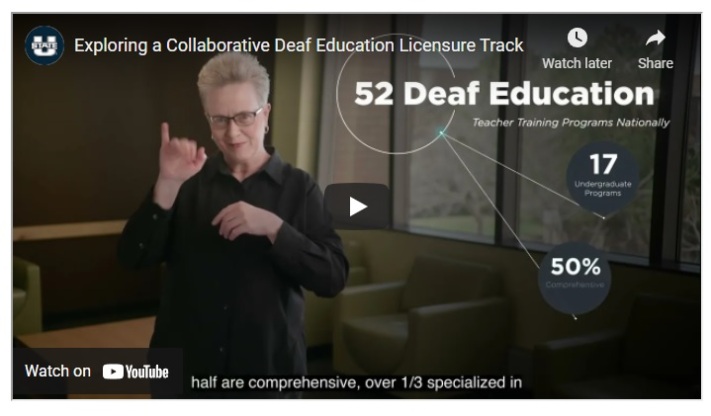Big announcement!!!
Watch the video.

It might help to discuss this together first. What do you all think about this?
Also, I am collecting any questions you may have to send to Dr. Munoz and Dr. Nelson — director and chair of the program. You can email your questions to contact@hellobibi.org or comment on this post.

Terms: ASL=American Sign Language; USU=Utah State University; Bi-Bi=Bilingual-Bicultural (the equal study of 2 languages and 2 cultures, especially as they interact with each other); LSL=Language and Spoken Language; Deaf=culturally deaf individual; LRE=Least-Restrictive Environment; FAPE=Free and Appropriate Public Education; LEAD-K=Language Equality and Acquisition for Deaf Kids
After my initial thought of “Aww, USU Communication Disorders and Deaf Education Dept are working on re-imagining the Bi-Bi Deaf Education Program”, I realized that these good people need to hear from Deaf professionals, from the Deaf community, and from those people who have an understanding of what makes a successful teacher-training program.
1. One minor change I would ask for would be to say the entire name of the Utah School for the Deaf and Blind and not use the acronym USDB by itself.
2. I noticed the video first mentions the on-line Bi-Bi course program would partner up with school districts around the state; that school districts would be the primary collaborators with the Bi-Bi program administrator(s). This is NOT something school districts can do and I’ll tell you why.
Mainstreaming is not the first goal of the Bilingual-Bicultural environment. It might be the first goal for the Language-and-Spoken Language (LSL) education program but it CANNOT BE the first goal of this Bi-Bi program.
The first goal of the Bi-Bi teacher Deaf Education program must be to fit teacher candidates to be able to go into a language- rich environment where deaf children are provided with adults, teachers, and peers who know the language that is most accessible to the deaf child. This is the true meaning of the Least-Restrictive educational Environment. LRE cannot be achieved in the mainstreamed school setting (public school or private school). The adults and teachers who are using ASL in the school setting for these deaf children become language models for them. It’s also important for deaf children to have peers who also use ASL. When everyone in this academic space uses ASL, this becomes the language-rich environment where a deaf child can thrive.
A deaf child placed in mainstreamed classes will not be exposed to enough language for he/she to progress and learn.
3. I’m also bothered by the inappropriateness of continuing to put Deaf Education under Special Education. We need a Dept for Special Education for those students who have a need for remediation where pacing the learning can match their learning speed. But Deaf Education, especially Bi-Bi Deaf Education, is not a remedial program. As a corollary, Deaf Education needs to be it’s own Dept or, at the very least, under the College of Education. It doesn’t belong to Special Education any more. With access to a bonafide language of signs, the deaf child can achieve grade-level skills.
The purpose of the Bi-Bi approach to educating a deaf child is to provide a language of instruction that is a) compatible with the language needs of the deaf child and b) gives the deaf child access to grade-level appropriate education.
The movement called Language Equality and Acquisition for Deaf Kids (LEAD-K) should be invited to join this discussion or, at the very least, include their philosophy, findings, and techniques into this discussion.
I feel like it’s up to this group of stakeholders (Deaf professionals, Deaf community members, and those who have an understanding of the educational and language needs of deaf children) to furnish input during this very fragile time when USU’s Strategic Planning Committee is needing more guidance. We can add our little ‘jets’ (our ideas) to the discussion in order to steer the ‘spaceship’ (the Strategic Planning Committee) through this process.
4. The video didn’t make it clear how the Bi-Bi teacher candidates, who are doing a totally on-line course, would do their required Student Teaching along with their Language Practicums. This component of practicing and becoming proficient in the language cannot be neglected.
These are my initial thoughts. I look forward to more discussion.
Bronwyn O’Hara
spouse of deaf
parent of Deaf
Deaf-community friend
LikeLiked by 1 person